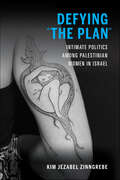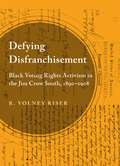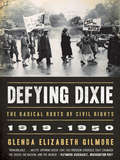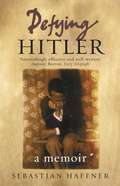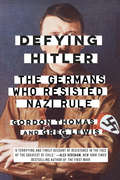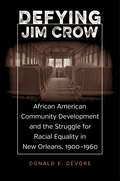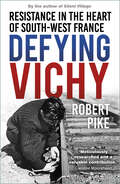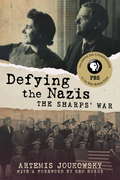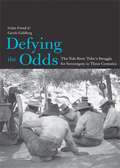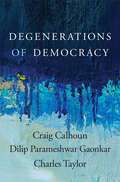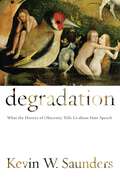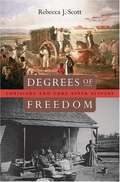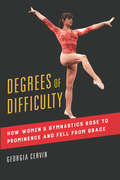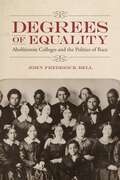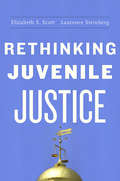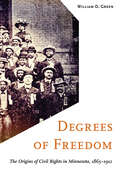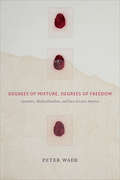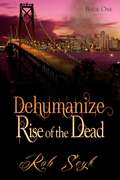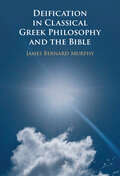- Table View
- List View
Defy Not the Heart (Shefford's Knights #1)
by Johanna LindseyReina seethes with rage over her fate: taken captive by the knight Ranulf -- a golden giant of a man -- who has pledged to deliver her to the nuptial bed of the despised Lord Rothwell. She will never accept such bondage -- and Reina offers herself to her kidnapped instead, offering to make Ranulf a great lord...if he agrees to wed her.But the brave knight desires much more than a marriage of convenience from this proud, headstrong lady who treats him with scorn yet makes his blood run hotter than liquid fire. She must come to him of her own free will -- or Ranulf will take her. For the passion that consumes them both cannot long be denied -- even though gravest peril surely awaits them on the heart's trail to a destines and turbulent love.
Defy the Thunder
by Kay McmahonShe wanted a taste of adventure. But rebellious Alexandra Pembrooke stepped into a world of danger-and found herself tangled in the steely arms of Christian Page. A man whose seeming brutality masked a secret purpose-and a secret passion. She tore herself from his heated embrace in time to save her virtue, and he and his criminal companions were sent to prison. But fate would bring Alexandra and Christian together once again, in the lush, untamed land of Australia ... where Alexandra would finally taste true adventure-and the wild ecstasy of love.
Defying "The Plan": Intimate Politics among Palestinian Women in Israel
by Kim Jezabel ZinngrebeLiving under settler colonialism and patriarchal oppressions, Palestinian women in Israel are expected to operate even the most intimate aspects of their lives according to what some call "The Plan," which dictates everything from clothing, marriage, religion, and sex to how children are born and raised. In Defying "The Plan," Kim Jezabel Zinngrebe draws from a series of moving interviews to reveal that despite various forms of intertwined oppressions by both the Israeli state and Palestinian society, Palestinian women show defiance by the quotidian choices they make in their own intimate lives under occupation, which, Zinngrebe argues, cannot be perceived as a mere corollary but constitute a pivotal and contested terrain of the struggle between settler and colonized. Defying "The Plan" explores such issues as the segregation of sexual education in Palestine; the politics of dress, menstruation, and tattoos; and the roles of class, feminism, and race. Importantly, she highlights the intersectional experiences of women typically excluded from existing accounts, such as Black Palestinian women, women with disabilities, unmarried and divorced women, Bedouin women, and LGBTQI women. The stories gathered in Defying "The Plan" trace and unpack settler colonial power at the level of the intimate and native women's various practices of defiance.
Defying Disfranchisement: Black Voting Rights Activism in the Jim Crow South, 1890-1908
by R. Volney RiserIn the late nineteenth and early twentieth century, Jim Crow strengthened rapidly and several southern states adopted new constitutions designed primarily to strip African American men of their right to vote. Since the Fifteenth Amendment to the United States Constitution prohibited eliminating voters based on race, the South concocted property requirements, literacy tests, poll taxes, white primaries, and white control of the voting apparatus to eliminate the region's black vote almost entirely. Desperate to save their ballots, black political leaders, attorneys, preachers, and activists fought back in the courts, sustaining that resistance until the nascent NAACP took over the legal battle. In Defying Disfranchisement, R. Volney Riser documents a number of lawsuits challenging restrictive voting requirements. Though the U.S. Supreme Court received twelve of these cases, that body coldly ignored the systematic disfranchisement of black southerners. Nevertheless, as Riser shows, the attempts themselves were stunning and demonstrate that African Americans sheltered and nurtured a hope that led to wholesale changes in the American legal and political landscape.Riser chronicles numerous significant antidisfranchisement cases, from South Carolina's Mills v. Green (1985), the first such case to reach the Supreme Court, and Williams v. Mississippi, (1898), the well-known but little-understood challenge to Mississippi's constitution, to the underappreciated landmark Giles v. Harris -- described as the "Second Dred Scott" by contemporaries -- in which the Court upheld Alabama's 1901 state constitution. In between, he examines a host of voting rights campaigns waged throughout the country and legal challenges initiated across the South by both black and white southerners. Often disputatious, frequently disorganized, and woefully underfunded, the antidisfranchisement activists of 1890--1908 lost, and badly; in some cases, their repeated and infuriating defeats not only left the status quo in place but actually made things worse. Regardless, they brought attention to the problem and identified the legal questions and procedural difficulties facing African Americans. Rather than present southern blacks as victims during the roughest era of discrimination, in Defying Disfranchisement Riser demonstrates that they fought against Jim Crow harder and earlier than traditional histories allow, and they drew on their own talents and resources to do so. With slim ranks and in the face of many defeats, this daring and bold cadre comprised a true vanguard, blazing trails that subsequent generations of civil rights activists followed and improved. By making a fight at all, Riser asserts, these organizers staged a necessary and instructive prelude to the civil rights movement.
Defying Dixie: The Radical Roots of Civil Rights, 1919-1950
by Glenda Elizabeth Gilmore"Remarkable . . . an eye-opening book [on] the freedom struggle that changed the South, the nation, and the world." --Washington Post The civil rights movement that looms over the 1950s and 1960s was the tip of an iceberg, the legal and political remnant of a broad, raucous, deeply American movement for social justice that flourished from the 1920s through the 1940s. This rich history of that early movement introduces us to a contentious mix of home-grown radicals, labor activists, newspaper editors, black workers, and intellectuals who employed every strategy imaginable to take Dixie down. In a dramatic narrative Glenda Elizabeth Gilmore deftly shows how the movement unfolded against national and global developments, gaining focus and finally arriving at a narrow but effective legal strategy for securing desegregation and political rights.
Defying Evil: How the Italian Army Saved Croatian Jews During the Holocaust
by Benjamin WoodThe fascinating World War II story of the techniques used by the Italian Army to thwart the operations of the Nazi-allied Croatian government to send Jews to the Holocaust. The author reveals the brutal techniques used by the Croatian officials to aid the Nazis and the death camps in Croatia never before recognized in Post World War II investigations.
Defying Hitler: A Memoir
by Sebastian HaffnerAn absolute classic of autobiography and history - one of the few books to explore how and why the Germans were seduced by Hitler and Nazism.'If you have never read a book about Nazi Germany before, or if you have already read a thousand, I would urge you to read DEFYING HITLER. It sings with wisdom and understanding' DAILY MAILSebastian Haffner was a non-Jewish German who emigrated to England in 1938. This memoir (written in 1939 but only published now for the first time) begins in 1914 when the family summer holiday is cut short by the outbreak of war, and ends with Hitler's assumption of power in 1933. It is a portrait of himself and his own generation in Germany, those born between 1900 and 1910, and brilliantly explains through his own experiences and those of his friends how that generation came to be seduced by Hitler and Nazism. The Germans lacked an outlet for self-expression: where the French had amour, food and wine, and the British their gardens and their pets, the Germans had nothing, leading to a tendency towards mass psychosis. The upheaval of post-WWI revolution, factionalism and inflation left the Germans addicted to excitement and action: Hitler provided this, and more.
Defying Hitler: The Germans Who Resisted Nazi Rule
by Gordon Thomas Greg Lewis"A terrifying and timely account of resistance in the face of the greatest of evils.”—Alex Kershaw, New York Times bestselling author of The First WaveAn enthralling story that vividly resurrects the web of everyday Germans who resisted Nazi ruleNazi Germany is remembered as a nation of willing fanatics. But beneath the surface, countless ordinary, everyday Germans actively resisted Hitler. Some passed industrial secrets to Allied spies. Some forged passports to help Jews escape the Reich. For others, resistance was as simple as writing a letter denouncing the rigidity of Nazi law. No matter how small the act, the danger was the same--any display of defiance was met with arrest, interrogation, torture, and even death.Defying Hitler follows the underground network of Germans who believed standing against the Fuhrer to be more important than their own survival. Their bravery is astonishing--a schoolgirl beheaded by the Gestapo for distributing anti-Nazi fliers; a German American teacher who smuggled military intel to Soviet agents, becoming the only American woman executed by the Nazis; a pacifist philosopher murdered for his role in a plot against Hitler; a young idealist who joined the SS to document their crimes, only to end up, to his horror, an accomplice to the Holocaust. This remarkable account illuminates their struggles, yielding an accessible narrative history with the pace and excitement of a thriller.
Defying Jim Crow: African American Community Development and the Struggle for Racial Equality in New Orleans, 1900–1960 (Voices of the South)
by Donald E. DeVoreFrom the earliest days of Jim Crow, African Americans in New Orleans rallied around the belief that the new system of racially biased laws, designed to relegate them to second-class citizenship, was neither legitimate nor permanent. Drawing on shared memories of fluid race relations and post–Civil War political participation, they remained committed to a disciplined and sustained pursuit of equality. Defying Jim Crow tells the story of this community’s decades-long struggle against segregation, disenfranchisement, and racial violence.Amid mounting violence and increasing exclusion, black New Orleanians believed their best defense depended upon maintaining a close-knit and politically engaged community. Donald E. DeVore’s peerless research shows how African Americans sought to reverse the trends of oppression by prioritizing the kind of capacity building—investment in education, participation in national organizations, and a spirit of entrepreneurship in markets not dominated by white businessmen—that would ensure the community’s ability to keep fighting for their rights in the face of setbacks and hostility from the city’s white leaders. As some black activists worked to attain equity within the “separate but equal” framework, they provided a firm foundation and crucial support for more overt challenges to the racist government structures.The result of over a decade’s research into the history of civil rights and community building in New Orleans, Defying Jim Crow provides a thorough and insightful analysis of race relations in one of America’s most diverse cities and offers a vital contribution to the complex history of the African American struggle for freedom.
Defying Vichy: Resistance in the Heart of South-West France
by Robert Pike‘Defying Vichy takes us into the heart of the French Resistance: the Dordogne region (in) this moving account of the darkest and brightest period in French history.’ – Matthew Cobb, author of The ResistanceVichy France under Marshal Pétain was an authoritarian regime that sought to perpetuate a powerful place for France in the world alongside Germany. It echoed the right-wing ideals of other fascist states and was a perfect instrument for Hitler, who drew more and more power and resources from a beaten France whose people suffered. Resistance was an unknown until a small number sought to make a stand in whatever way they could. Each would play their part in destabilising the Vichy state, all the while rejecting the Nazi occupation of their eternal France.The Dordogne was one of many hotbeds of early refusal and its dramatic stories are here told against the backdrop of the rise and fall of Vichy France. These stories, like so many others of often ordinary people – men and women, young and old – tell of a period of betrayal, refusal and heroism.
Defying the Nazis: The Sharps' War
by Ken Burns Artemis JoukowskyOfficial companion to the Ken Burns film premiering September 20, 2016, on PBS tells the little-known story of the Sharps, an otherwise ordinary couple whose faith and commitment to social justice inspired them to undertake dangerous rescue and relief missions across war-torn Europe, saving the lives of countless refugees, political dissidents, and Jews on the eve of World War II.In 1939, the Reverend Waitstill Sharp, a young Unitarian minister, and his wife, Martha, a social worker, accepted a mission from the American Unitarian Association: they were to leave their home and young children in Wellesley, Massachusetts, and travel to Prague, Czechoslovakia, to help address the mounting refugee crisis. Seventeen ministers had been asked to undertake this mission and had declined; Rev. Sharp was the first to accept the call for volunteers in Europe.Armed with only $40,000, Waitstill and Martha quickly learned the art of spy craft and undertook dangerous rescue and relief missions across war-torn Europe, saving refugees, political dissidents, and Jews on the eve of World War II. After narrowly avoiding the Gestapo themselves, the Sharps returned to Europe in 1940 as representatives of the newly formed Unitarian Service Committee and continued their relief efforts in Vichy France.A fascinating portrait of resistance as told through the story of one courageous couple, Defying the Nazis offers a rare glimpse at high-stakes international relief efforts during WWII and tells the remarkable true story of a couple whose faith and commitment to social justice inspired them to risk their lives to save countless others.A companion documentary film was directed by Ken Burns and Artemis Joukowsky.
Defying the Odds: The Tule River Tribe's Struggle for Sovereignty in Three Centuries
by Gelya Frank Carole GoldbergAn anthropologist and a legal scholar combine expertise in this innovative book, deploying the history of one California tribe--the Tule River Tribe--in a definitive study of indigenous sovereignty from earliest contact through the current Indian gaming era.
Degenerations of Democracy
by Charles Taylor Craig Calhoun Dilip Parameshwar GaonkarThree leading thinkers analyze the erosion of democracy’s social foundations and call for a movement to reduce inequality, strengthen inclusive solidarity, empower citizens, and reclaim pursuit of the public good. Democracy is in trouble. Populism is a common scapegoat but not the root cause. More basic are social and economic transformations eroding the foundations of democracy, ruling elites trying to lock in their own privilege, and cultural perversions like making individualistic freedom the enemy of democracy’s other crucial ideals of equality and solidarity. In Degenerations of Democracy three of our most prominent intellectuals investigate democracy gone awry, locate our points of fracture, and suggest paths to democratic renewal. In Charles Taylor’s phrase, democracy is a process, not an end state. Taylor documents creeping disempowerment of citizens, failures of inclusion, and widespread efforts to suppress democratic participation, and he calls for renewing community. Craig Calhoun explores the impact of disruption, inequality, and transformation in democracy’s social foundations. He reminds us that democracies depend on republican constitutions as well as popular will, and that solidarity and voice must be achieved at large scales as well as locally. Taylor and Calhoun together examine how ideals like meritocracy and authenticity have become problems for equality and solidarity, the need for stronger articulation of the idea of public good, and the challenges of thinking big without always thinking centralization. Dilip Parameshwar Gaonkar points out that even well-designed institutions will not integrate everyone, and inequality and precarity make matters worse. He calls for democracies to be prepared for violence and disorder at their margins—and to treat them with justice, not oppression. The authors call for bold action building on projects like Black Lives Matter and the Green New Deal. Policy is not enough to save democracy; it will take movements.
Degradation: What the History of Obscenity Tells Us about Hate Speech
by Kevin W SaundersThroughout history obscenity has not really been about sex but about degradation. Sexual depictions have been suppressed when they were seen as lowering the status of humans, furthering our distance from the gods or God and moving us toward the animals. In the current era, when we recognize ourselves and both humans and animals, sexual depiction has lost some of its sting. Its degrading role has been replaced by hate speech that distances groups, whether based on race, ethnicity, gender, or sexual orientation, not only from God but from humanity to a subhuman level. In this original study of the relationship between obscenity and hate speech, First Amendment specialist Kevin W. Saunders traces the legal trajectory of degradation as it moved from sexual depiction to hateful speech. Looking closely at hate speech in several arenas, including racist, homophobic, and sexist speech in the workplace, classroom, and other real-life scenarios, Saunders posits that if hate speech is today’s conceptual equivalent of obscenity, then the body of law that dictated obscenity might shed some much-needed light on what may or may not qualify as punishable hate speech.
Degrees Of Freedom: Louisiana and Cuba After Slavery
by Rebecca J. ScottAs Louisiana and Cuba emerged from slavery in the late nineteenth century, each faced the question of what rights former slaves could claim. Degrees of Freedom compares and contrasts these two societies in which slavery was destroyed by war, and citizenship was redefined through social and political upheaval. Both Louisiana and Cuba were rich in sugar plantations that depended on an enslaved labor force. After abolition, on both sides of the Gulf of Mexico, ordinary people—cane cutters and cigar workers, laundresses and labor organizers—forged alliances to protect and expand the freedoms they had won. But by the beginning of the twentieth century, Louisiana and Cuba diverged sharply in the meanings attributed to race and color in public life, and in the boundaries placed on citizenship. <p><p> Louisiana had taken the path of disenfranchisement and state-mandated racial segregation; Cuba had enacted universal manhood suffrage and had seen the emergence of a transracial conception of the nation. What might explain these differences? <p> Moving through the cane fields, small farms, and cities of Louisiana and Cuba, Rebecca Scott skillfully observes the people, places, legislation, and leadership that shaped how these societies adjusted to the abolition of slavery. The two distinctive worlds also come together, as Cuban exiles take refuge in New Orleans in the 1880s, and black soldiers from Louisiana garrison small towns in eastern Cuba during the 1899 U.S. military occupation. <p> Crafting her narrative from the words and deeds of the actors themselves, Scott brings to life the historical drama of race and citizenship in postemancipation societies.
Degrees of Difficulty: How Women's Gymnastics Rose to Prominence and Fell from Grace (Sport and Society #1)
by Georgia CervinHow the Cold War era changed the trajectory of women's gymnastics Electrifying athletes like Olga Korbut and Nadia Comăneci helped make women’s artistic gymnastics one of the most popular events in the Olympic Games. But the transition of gymnastics from a women’s sport to a girl’s sport in the 1970s also laid the foundation for a system of emotional, physical, and sexual abuse of gymnasts around the world. Georgia Cervin offers a unique history of women's gymnastics, examining how the high-stakes diplomatic rivalry of the Cold War created a breeding ground for exploitation. Yet, a surprising spirit of international collaboration arose to decide the social values and image of femininity demonstrated by the sport. Cervin also charts the changes in style, equipment, training, and participants that transformed the sport, as explosive athleticism replaced balletic grace and gymnastics dominance shifted from East to West. Sweeping and revelatory, Degrees of Difficulty tells a story of international friction, unexpected cooperation, and the legacy of abuse and betrayal created by the win-at-all-cost attitudes of the Cold War.
Degrees of Equality: Abolitionist Colleges and the Politics of Race
by John Frederick BellThe abolitionist movement not only helped bring an end to slavery in the United States but also inspired the large-scale admission of African Americans to the country’s colleges and universities. Oberlin College changed the face of American higher education in 1835 when it began enrolling students irrespective of race and sex. Camaraderie among races flourished at the Ohio institution and at two other leading abolitionist colleges, Berea in Kentucky and New York Central, where Black and white students allied in the fight for emancipation and civil rights. After Reconstruction, however, color lines emerged on even the most progressive campuses. For new generations of white students and faculty, ideas of fairness toward African Americans rarely extended beyond tolerating their presence in the classroom, and overt acts of racial discrimination grew increasingly common by the 1880s.John Frederick Bell’s Degrees of Equality analyzes the trajectory of interracial reform at Oberlin, New York Central, and Berea, noting its implications for the progress of racial justice in both the nineteenth and twenty-first centuries. Drawing on student and alumni writings, institutional records, and promotional materials, Bell interrogates how abolitionists and their successors put their principles into practice. The ultimate failure of these social experiments illustrates a tragic irony of abolitionism, as the achievement of African American freedom and citizenship led whites to divest from the project of racial pluralism.
Degrees of Freedom: Louisiana and Cuba after Slavery
by Rebecca J. Scott Laurence D SteinbergAs Louisiana and Cuba emerged from slavery in the late nineteenth century, each faced the question of what rights former slaves could claim. Degrees of Freedom compares and contrasts these two societies in which slavery was destroyed by war, and citizenship was redefined through social and political upheaval. Both Louisiana and Cuba were rich in sugar plantations that depended on an enslaved labor force. After abolition, on both sides of the Gulf of Mexico, ordinary people-cane cutters and cigar workers, laundresses and labor organizers-forged alliances to protect and expand the freedoms they had won. But by the beginning of the twentieth century, Louisiana and Cuba diverged sharply in the meanings attributed to race and color in public life, and in the boundaries placed on citizenship. Louisiana had taken the path of disenfranchisement and state-mandated racial segregation; Cuba had enacted universal manhood suffrage and had seen the emergence of a transracial conception of the nation. What might explain these differences? Moving through the cane fields, small farms, and cities of Louisiana and Cuba, Rebecca Scott skillfully observes the people, places, legislation, and leadership that shaped how these societies adjusted to the abolition of slavery. The two distinctive worlds also come together, as Cuban exiles take refuge in New Orleans in the 1880s, and black soldiers from Louisiana garrison small towns in eastern Cuba during the 1899 U.S. military occupation. Crafting her narrative from the words and deeds of the actors themselves, Scott brings to life the historical drama of race and citizenship in postemancipation societies.
Degrees of Freedom: The Origins of Civil Rights in Minnesota, 1865–1912
by William D. GreenThe true story, and the black citizens, behind the evolution of racial equality in Minnesota He had just given a rousing speech to a packed assembly in St. Paul, but Frederick Douglass, confidant to the Great Emancipator and conscience of the Republican Party, was denied a hotel room because he was black. This was Minnesota in 1873, four years after the state had approved black suffrage—a state where &“freedom&” meant being unshackled from slavery but not social restrictions, where &“equality&” meant access to the ballot but not to a restaurant downtown. Spanning the half-century after the Civil War, Degrees of Freedom draws a rare picture of black experience in a northern state and of the nature of black discontent and action within a predominantly white, ostensibly progressive society. William D. Green reveals little-known historical characters among the black men and women who moved to Minnesota following the Fifteenth Amendment; worked as farmhands and laborers; built communities (such as Pig&’s Eye Landing, later renamed St. Paul), businesses, and a newspaper (the Western Appeal); and embodied the slow but inexorable advancement of race relations in the state over time. Within this absorbing, often surprising, narrative we meet &“ordinary&” citizens, like former slave and early settler Jim Thompson and black barbers catering to a white clientele, but also personages of national stature, such as Frederick Douglass, Booker T. Washington, and W. E. B. Du Bois, all of whom championed civil rights in Minnesota. And we see how, in a state where racial prejudice and oppression wore a liberal mask, black settlers and entrepreneurs, politicians, and activists maneuvered within a restricted political arena to bring about real and lasting change.
Degrees of Mixture, Degrees of Freedom: Genomics, Multiculturalism, and Race in Latin America
by Peter WadeRace mixture, or mestizaje, has played a critical role in the history, culture, and politics of Latin America. In Degrees of Mixture, Degrees of Freedom, Peter Wade draws on a multidisciplinary research study in Mexico, Brazil, and Colombia. He shows how Latin American elites and outside observers have emphasized mixture's democratizing potential, depicting it as a useful resource for addressing problems of racism (claiming that race mixture undoes racial difference and hierarchy), while Latin American scientists participate in this narrative with claims that genetic studies of mestizos can help isolate genetic contributors to diabetes and obesity and improve health for all. Wade argues that, in the process, genomics produces biologized versions of racialized difference within the nation and the region, but a comparative approach nuances the simple idea that highly racialized societies give rise to highly racialized genomics. Wade examines the tensions between mixture and purity, and between equality and hierarchy in liberal political orders, exploring how ideas and scientific data about genetic mixture are produced and circulate through complex networks.
Dehumanize: Rise of the Dead
by Robert SeykNo one knows what horrors they are capable of when they are pushed to a point of no return. Dan Draden was living a normal routine life in a suburb outside of San Francisco along with his newly pregnant wife, Lillian, and his six-year-old son Galton. When Dan assists in the arrest and prevention of a terrorist attack, the group retaliates, blowing up Dan's wife and child. As chaos engulfs Dan and the city around him, a man approaches Dan with an offer to avenge the death of his family. Dan becomes part of an elite assassin group. When the team discovers multiple religious fundamentalist groups, normally at odds with each other, working together; they uncover a weapon with apocalyptic capabilities. The living dead. Dehumanize: Rise of the Dead utilizes historical events to illustrate the origins and beginning of a global apocalypse where the dead are creating genocide on the living.
Dei gesta per Francos: Etudes sur les croisades dédiées à Jean Richard - Crusade Studies in Honour of Jean Richard
by Benjamin Z. Kedar Michel BalardProfessor Jean Richard is the doyen of crusade historians. Although also well-known as one of the most distinguished historians of Burgundy, he has through publications which have been appearing for over half a century established himself as the greatest living scholar working on crusading and the Latin East. His book on twelfth-century Tripoli, published in 1945, is still the standard work on the county. In the 1950s he, and Joshua Prawer, provided a revolutionary approach towards the constitution and institutions of the kingdom of Jerusalem. He went on to pave the way for an entirely new understanding of the kingdom of Cyprus. In the 1960s he was one of a few historians who were sign-posting a more empathetic view of the ideology of crusading and the motivation of crusaders, and he developed his ideas further in recent monographs on Saint Louis and on the crusades in general. His work on Catholic missions to Asia and the role of the papacy in those enterprises is generally regarded as setting standards which few can approach. To celebrate his eightieth birthday thirty-nine colleagues have contributed articles in fields which themselves illustrate Professor Richard’s breadth of interest: the crusades, the military orders, and the Latin settlements on the Levantine mainland and the island of Cyprus.
Deification in Classical Greek Philosophy and the Bible
by James Bernard MurphyTo be human is to strive to be better, and we cannot be better without knowing what is best. In ancient Greek philosophy and the Bible, what is best is god. Plato and Aristotle argue that the goal of human life is to become as much like god as is humanly possible. Despite its obvious importance, this theme of assimilation to god has been neglected in Anglo-American scholarship. Classical Greek philosophy is best understood as a religious quest for divinity by means of rational discipline. By showing how Greek philosophy grows out of ancient Greek religion and how the philosophical quest for god compares to the biblical quest, we see Plato and Aristotle properly as major religious thinkers. In their shared quest for divine perfection, Greek philosophy and the Bible have enough in common to make their differences deeply illuminating.
Deindustrialisation in Twentieth-Century Europe: The Northwest of Italy and the Ruhr Region in Comparison (Palgrave Studies in the History of Social Movements)
by Stefan Berger Christian Wicke Stefano MussoExploring two large economies which were heavily affected by deindustrialisation in the late twentieth century, this book provides insights into the social movements that brought about and also challenged industrial reduction in Europe. Both the Ruhr region in Germany and the Northwest of Italy experienced major structural transformation from the 1960s as a result of deindustrialisation. With contributions from experts in the field, this collection provides a comparative overview of each region, examining policy implementation, class relations, the changing political economy and environmental impact. Analysing industrial and post-industrial landscapes, urban developments and labour relations, the authors place their transnational findings within the context of the wider literature on deindustrialisation in the global North. A much-needed contribution to deindustrialisation studies, which have traditionally focused on North America and the UK, this book is a useful read for those researching deindustrialisation and the social history of Europe.
Deirdre and Desire (Six Sisters #3)
by Marion ChesneyDeirdre, the third daughter, has just fallen in love with Guy Wentwater, Annabelle's first love, who is planning to use her for vengeance on the Armitage family. The vicar has no knowledge of it, and arranges a marriage for her with Lord Harry Desire. Lord Harry seems to her to be a vacuous fool, but her opinion of him gradually begins to change after he rescues her from the disaster of an attempted elopement, but not in time to prevent his releasing her from the engagement. She runs into Guy again, and, even after previous shameful treatment at his hands, asks him to elope with her again. Desire humiliates him again, with Deirdre's unwitting help.


